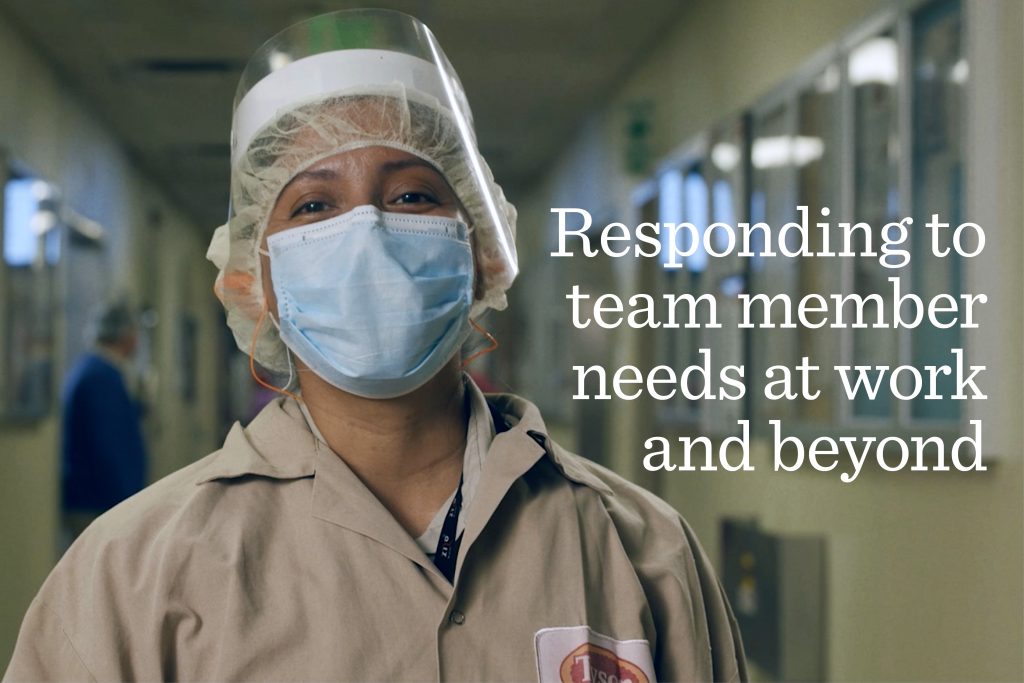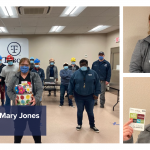When the COVID-19 pandemic began, we quickly became aware of the many ways it impacted our team members. And in the weeks and months that have passed, we have committed ourselves to care for them both at work and home, if emergency needs have arisen.
First and foremost, we’ve helped ensure they feel safe and have protective measures in place at work. And we’re continuing to do so through our COVID monitoring strategy, including an expanded health services team, and health clinic pilots.
This pilot program, which we began working on about a year ago, will establish clinics near company production facilities at seven of our locations and help advance a culture of health in our company.
We supplemented those efforts with changes to benefits like increasing short-term disability coverage to 90% of normal pay for team members who are unable to work due to illness. And, we took additional measures such as:
- Waiving the co-pay, co-insurance and deductible for doctor visits for COVID-19 testing as well as eliminating pre-approval or preauthorization steps
- Waiving co-pays for the use of telemedicine
- Relaxing refill limits for 30-day prescriptions of maintenance medication
In addition, we gave $1,000 bonuses to approximately 106,000 of our domestic frontline workers as a “thank you” for helping feed the nation. Team members who could not come to work due to illness or childcare still qualified for the bonus.
Knowing much of the pandemic affected team members on a personal level, we expanded our Helping Hands program to assist with some of the unexpected costs they’ve incurred along the way. These include medical expenses, rent, food, essential utilities, and clothing – totaling over $6 million in direct financial support.
Another way team members have used Helping Hands funding is for childcare – an area Tyson Foods identified as an immediate need early on. Senior Vice President Hector Gonzalez says plant management have worked with team members to arrange or change their shifts and even adjust their role if necessary, in order to allow them to care for their kids.
Schools reopening this fall has helped ease a bit of that burden, with some school districts going the extra mile to provide childcare for food supply and other frontline workers in the area. Springdale Public Schools in Arkansas is one of them, offering flexible care options for Pre-K through 7th grade during the fall semester with no income restrictions.
The Boys & Girls Club of Mitchell County, near our Camilla, Georgia plant, also stepped in with special arrangements for our team members. After they reopened during the pandemic, one of their locations adjusted hours to provide childcare during the Tyson early morning shift – even over the summer.
“We’re committed to understanding the needs of our workforce given the fluid nature of COVID,” Gonzalez said. “There are a number of options available today that weren’t there before.” Which means fewer team members feel the burdens they initially experienced in the spring.
Many in our immigrant community have been able to continue educational and citizenship opportunity programs available to them during this time, thanks to Upward Academy and grants awarded to supporting organizations. Upward Academy successfully adapted to challenges presented by COVID by providing instruction in alternative settings. Instructors sent printed materials home, helped students access curriculum on their phones and provided Microsoft SurfaceGo tablets so students could continue learning without an instructor.
It’s all part of how communities and groups have come together to support those who are helping put food on America’s tables – and provide stability in uncertain times.
Fore more information on what we’re doing to care for Tyson Foods team members, visit our COVID-19 response page.





